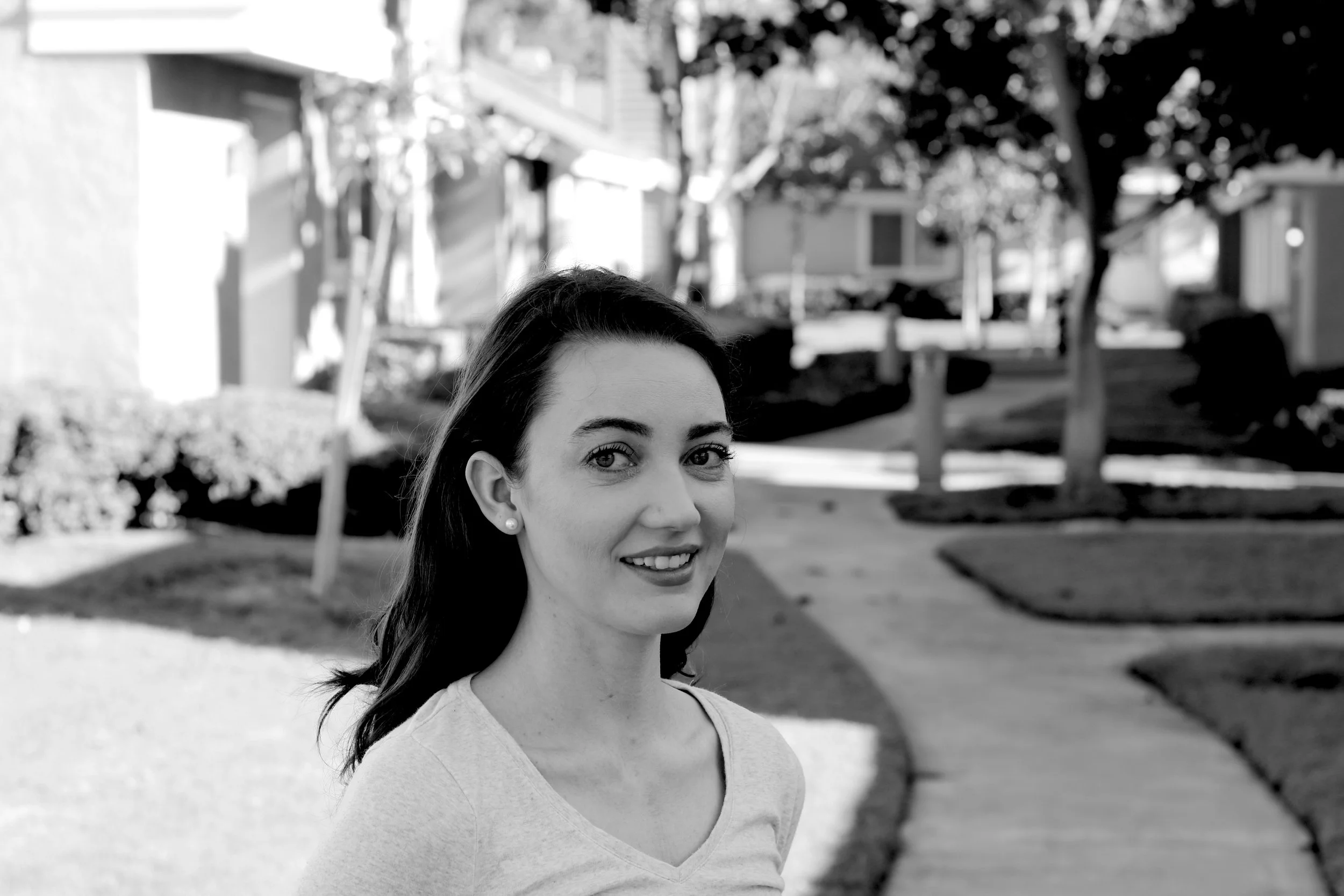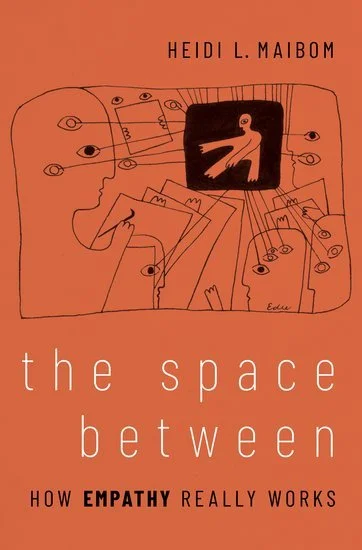Hannah Read is currently a postdoc at Wake Forest, working primarily at the intersection of moral philosophy and philosophy of psychology. Her work also engages issues in feminist philosophy, social and political philosophy, the ethics of AI, and philosophy of education. She completed her PhD in Philosophy at Duke, her MA in Philosophy at Tufts, and her BA in Philosophy and Literary Studies at The New School.
This week at The Junkyard we’re hosting a symposium on Heidi Maibom’s recent book The Space Between: How Empathy Really Works (OUP 2022). See here for an introduction from Heidi. Commentaries and replies are appearing Tuesday through Friday.
* * *
Perspective Taking and Social Difference: Commentary from Hannah Read
Talk of perspective taking—its benefits and its challenges—is ubiquitous across philosophy, psychology, neuroscience, and more recently computer science. But for all that talk, relatively little has been said about what exactly a perspective is and what taking others’ perspectives involves. (A notable exception to this is Camp, 2013, 2017). At long last, The Space Between provides a comprehensive and engaging answer to these questions. In this exciting new work, Maibom draws our attention to perspective taking as a tool for achieving a fuller and more accurate picture of others, ourselves, and our shared world. As she rightly notes, we relate to the world via particular perspectives, which are themselves limited with respect to what they prompt us to attend to, care about, believe, and do. As she puts it, the “human point of view is always a view from somewhere,” and attempts to adopt a so-called objective or impartial perspective are futile (57). Instead, Maibom’s response to critics of empathy (which is a form of perspective taking, on her view) is that the antidote to the limited view of things that individual perspectives afford is not less empathy (or perspective taking), but rather more of it.
I am especially interested in this last claim, particularly in light of the fact that perspective-taking abilities differ widely across different sectors of society, often as a result of unjust social structures and dynamics.
In Part II, Maibom discusses a number of perspective taking’s limitations. For example, it is difficult for us to imagine visceral experiences—e.g. being tired or hungry—in ways that fully capture what those experiences are like when they are happening. This may make it difficult for us to take the perspective of someone who is currently having a particular visceral experience, at least with respect to that experience. Additionally, we tend to “focalize,” paying particular attention to certain features of a situation we are remembering (162). And our overall attitude toward the memory is affected by whether the features we are focusing on are negative or positive. So whether we are able to rely on our own experiences to imagine and understand those of others will depend a great deal on which of our own experiences we draw on in the process of simulation and which features of the relevant experiences we focus on. Then of course there are biases that affect whom we pay attention to and care about such that we are motivated to take their perspectives in the first place.
Maibom also acknowledges that, despite perspective taking’s limitations, it is a “skill” and something “we can train ourselves to do better” (165). She suggests several things that we can do to improve our perspective-taking skillfulness, including learning how to “hold back when it comes to visceral reactions,” “populate our imagined scenarios with more contextual factors” to safeguard against focalized imagining that obscures relevant details of a situation, and “imagine that the person we are trying to empathize with is someone we really care for” (176).
These strategies provide a helpful starting point for answering the question of how exactly we are to learn to do better. But they suggest a one-size-fits-all answer that is problematic given the fact that we are not all equally skillful when it comes to perspective taking, and the extent to which we are skillful appears, at least in part, to be a function of how much incentive we have to take others’ perspectives and improve our perspective-taking abilities, which is itself often determined by our position in a social network.
Maibom herself points to differences in perspective-taking abilities between psychopaths and non-psychopaths, as well as between those with relatively more and less social power—see, for instance, work by Keltner (2017) and Galinsky and colleagues (2006) that Maibom also cites. Similar results have been observed more recently in cases involving finer-grained differences in social power. See, for example, recent results from studies by Love and Davis (2021), which indicated superior perspective-taking abilities in Black as opposed to White women. These differences are commonly hypothesized to be due to the fact that perspective taking is required for some members of the population (i.e. the less powerful) who are disproportionately affected by the thoughts and feelings of others, but not for others (i.e. the more powerful) who are not similarly affected by those things. In fact, as work by Cameron and colleagues (2019) finds, we are often disinclined to empathize when the perceived cognitive, emotional, and material costs of doing so are high. And yet, not everyone can afford the luxury of avoiding this hard work. As Du Bois’ (1903) account of “double consciousness” or “second sight” underscores, it may not be possible for members of marginalized groups to resist taking the perspective of the dominantly situated, even when doing so requires adopting a harmful and unjust perspective on themselves. As a result, the burden of perspective taking falls disproportionately on some but not all members of society.
But if all this is right, then the claim that we need more empathy not less is an overstatement. Perhaps, instead, some of us need more empathy while others deserve a bit of a break.
None of this is incompatible with Maibom’s view of perspectives and perspective taking per se—a view that I think is enormously helpful for clarifying our understanding of these constructs. But it may suggest a slightly different focal point from the one that Maibom proposes. Put differently, perhaps we should be asking about the support required to ensure that perspective taking goes well, that the burden of perspective taking is evenly distributed across the population, and that perspective taking is well positioned to serve the many good purposes Maibom and others have rightly suggested it can. For example, what sorts of social and institutional support might be needed to motivate those who have little prudential reason to take others’ perspectives to do so? How can we prompt such individuals to imagine caring about people and things they have little immediate incentive to care about? What additional skills are needed to ensure that perspective-taking efforts go well across different cases? Armed with Maibom’s clear and compelling account of perspectives and perspective taking, we are now well positioned to begin to address these additional important questions.
References:
Cameron, C. D., Hutcherson, C. A., Ferguson, A. M., Scheffer, J. A., Hadjiandreou, E., & Inzlicht, M. (2019). Empathy is hard work: People choose to avoid empathy because of its cognitive costs. Journal of Experimental Psychology: General, 148(6), 962.
Camp, E. (2017). “Perspectives in imaginative engagement with fiction.” Philosophical Perspectives, 31(1), 73–102.
Camp, E. (2013). “Slurring perspectives.” Analytic Philosophy 54, no. 3 (2013): 330–349.
Du Bois, W. (1903). The Souls of Black Folks. Of Our Spiritual Strivings. Chicago: AC McClurg and Co.
Galinsky, A. D., Magee, J. C., Inesi, M. E., & Gruenfeld, D. H. (2006). Power and perspectives not taken. Psychological science, 17(12), 1068-1074.
Keltner, D. (2017). The power paradox: How we gain and lose influence. New York: Penguin.
Love, T.P. & Davis J.L. (2021). Racial Differences in Women’s Role-Taking Accuracy: How Status Matters.” Sociological Science, 8: 150- 169.
Maibom, H. (2022). The Space Between. New York: Oxford University Press.
Response from Heidi L. Maibom
In The Space Between, I argue that we need to take more perspectives than our own to better understand others, ourselves, and the world around us. Hannah Read points to the fact that tendencies and, perhaps, skills in perspective taking are unevenly distributed in a population. By and large, power and status play a significant role in perspective taking and empathy, with those who have more of it taking the perspective of those who have less of it, less. If that is right, Read asks, am I not wrong to suggest that we all need more empathy? Is it not rather the case that, in the interests of fairness, people in power should learn to doubt their own perspectives and recognize others’ perspectives, whereas those with less power should empathize less? But is this ever likely to happen given that power seems to be a disincentive to consider the perspectives of those with less power?
I have three things to say about this objection. First, interesting research, also by Galinsky and colleagues, suggest that the attitude a person in power has to being in power makes a difference to whether or not that person is liable to take the perspective of those over whom they have power (see, e.g., Galinsky, Rucker, and McGee 2016). In particular, it would seem that if the person in power has a sense of responsibility for the people they have power over, power increases perspective taking. One solution to the power-problem, then, is to encourage, from a societal point of view, an idea of power as one that involves responsibility. The idea is familiar from the French saying, noblesse oblige. This switch of perspective can also, of course, be practiced on a purely individual level. After all, it seems fairly logical that if one has power over people or creatures, one thereby has the ability to affect their welfare, which ought to give one pause.
Second, if one accepts the argument of my book, then it is evident that to be impartial, or more impartial at any rate, one must take a range of different perspectives. Most people assume that morality requires a degree of impartiality, wherefore to be moral, we must practice a certain amount of perspective taking. Assuming that most people are already motivated to be good (in a moral sense), they should also be motivated to take other people’s perspectives. This is, of course, also true of those in power.
Third, the ultimate solution to flagging enthusiasm about taking the perspective of those less powerful than oneself is, of course, to ensure equality of power. If everybody has equal power, everybody would be equally motivated to take each other’s perspective, the thought goes (though perhaps everybody would be equally uninterested in doing so). But to aim for perfect equality in all human relations is chimerical. It may not be desirable either. For instance, Sarah Blaffer Hrdy has argued that interpersonal understanding has evolved due to children’s dependence on adults as caregivers. Granted, Hrdy might have in mind theory of mind specifically, but it is not a stretch to suppose that the same logic applies to perspective taking. The need to understand those we depend upon is a first impulse towards developing skillful understanding of others.
References
Galinsky, A.D., Rucker, D.D., and Magee, J.C. 2016. Power and perspective-taking: A critical examination. Journal of Experimental Social Psychology, 67, 91-92.
Hrdy, S.B. 2009. Mothers and Others: The Evolutionary Origins of Mutual Understanding. Harvard: Harvard University Press.


